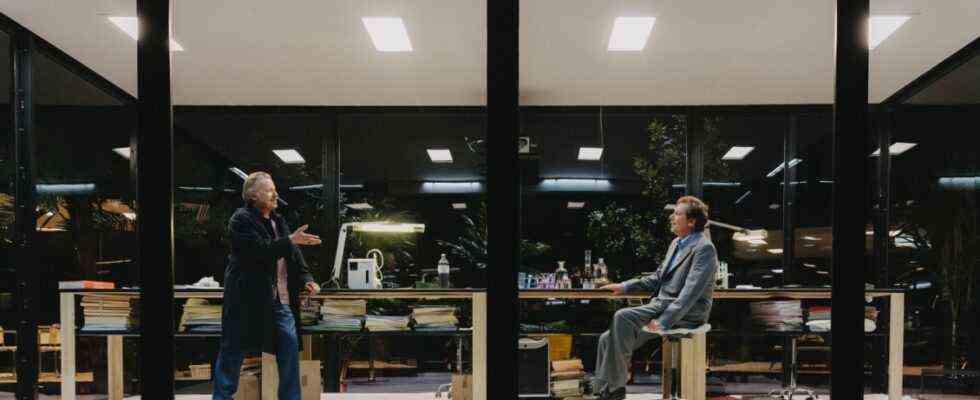The first corona death was registered in a play at the Vienna Burgtheater. The sick person also suffered from a weak heart and died shortly after being admitted to the hospital. But the pandemic is not the subject of Simon Stone’s new classic override at all. “Accomplices” is about the social inequality in society, about the glass wall between the classes and about the spiritual devastation that modern capitalism causes among capitalists.
This time the theater favorite Stone used two plays by Maxim Gorki as a template. One, “Children of the Sun” (1905), is a melancholy, Chekhov-style tragicomedy set against the backdrop of a cholera epidemic denied by an angry mob – a striking analogy to today’s corona demos, the Stone however does not take up. Instead, he combines “Children of the Sun” with the play “Feinde” (1906), in which the class struggle escalates in a family business: a factory owner is shot.
The new Stone creation came out at the Burgtheater shortly after his six-hour production “Our Time” (based on motifs by Horváth) at the Munich Residenztheater; the narrow gap is due to corona-related shifts. As usual, the Australian writer and director took over the essential parts of the plot from the original, but completely rewrote the dialogues. His play is not set in tsarist Russia, but in contemporary Vienna; The action takes place in an ensemble of fully glazed pavilions (stage: Bob Cousins), which form the modernist home of Paul and Tanya.
Between glass walls: Felix Rech and Birgit Minichmayr.
(Photo: Marcella Ruiz Cruz)
The chemist Paul (Michael Maertens) once just missed the Nobel Prize; That is one of the reasons why he drinks too much: when the piece begins, he is in the process of relieving a huge hangover with a whole carafe of Bloody Mary. The actress Tanya (Lilith Häßle) is a lot younger than her husband, who cares too little about her. Two friends of the house try to take advantage of the marital crisis: Dietmar (Roland Koch), a boastful filmmaker (“My friend Ken Loach says …”), tries to get Tanya; the slightly schizophrenic lawyer Melanie (Birgit Minichmayr) is after Paul: “Did I mention that I am one of Austria’s best divorce lawyers?” The food factory, to which the family owes its prosperity, is run by Uncle Matthias (Peter Simonischek), behind whose cozy fur seal facade is an ice-cold businessman. His ambitious managing director Raschid (Bardo Böhlefeld) is even more unscrupulous; the latter falls so unhappy in the course of a scuffle with indignant workers that he falls into a coma.
“Accomplices” is a great ensemble piece, especially brilliant in the couple scenes
What the title “accomplices” refers to is somewhat unclear; In any case, the piece offers the typical Stone mixture of witty well-made-play dialogues and current, hard topics; the almost four hours of playing time will not be long. It is noticeable, however, that the proletarian figures are overall less convincing than the others: The distant relationship that housekeeper Anita (Annamária Láng) has with her employers does not seem credible, and that the cleaning lady (Safira Robens) is a prospective medical student too fairytale. In-house technician Igor (Rainer Galke) is also not entirely plausible, but more complex: We get to know him as a dumb choleric who is about to be fired because of his sexist behavior; in the end, he became a broken, tragic figure – the Covid death mentioned at the beginning was his wife.
“Accomplices” is a great ensemble piece, but does not reach the density of Stone’s best works such as “Drei Schwestern” or “Hotel Strindberg”. He is at the height of his art especially in the wonderfully screwed up couple scenes, for example when the rivals Tanya and Melanie make friends over a lot of Chardonnay. When the men join in later, the situation develops in the direction of group sex – until a sudden onset of the outside world puts an end to the hustle and bustle: activists board the scene and spray the glass walls with slogans. The bad point of the piece, however, is: Before the revolution breaks out, an even more brutal capitalism – also in the relationships – takes power. In the end, Rasheed returns in a wheelchair and announces that he is now the majority owner of the company; He would like to have the family residence demolished.
Matthias, the old patriarch, has the last word. “It’s over,” he says calmly. “And it’s our own fault.”
© SZ / CD

